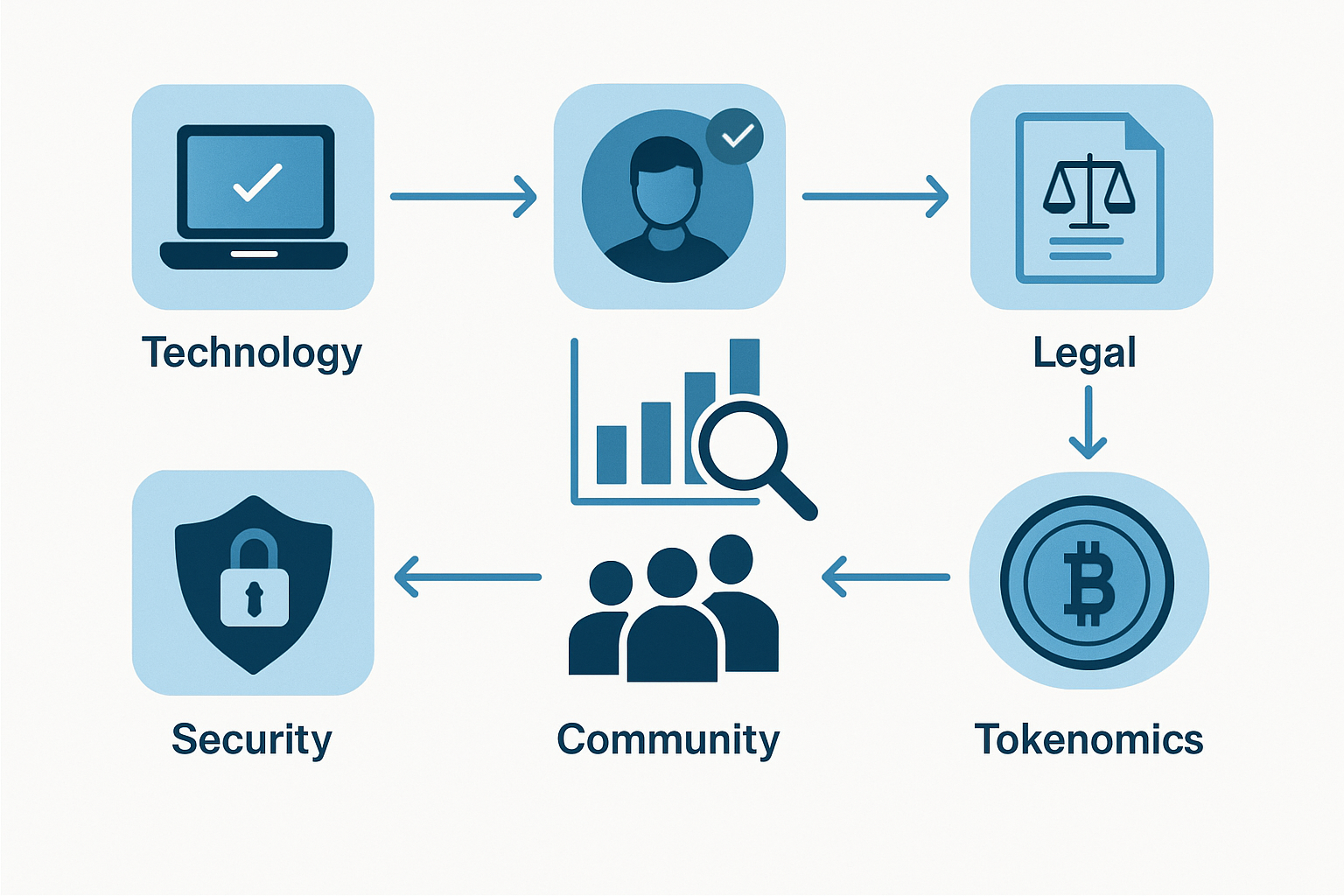What to Research Before Investing in Crypto Startups?


Investing in crypto startups tends to grab a lot of eyeballs thanks to the tempting high returns and cutting-edge innovations they promise. The sector’s notorious volatility and tricky complexity mean you’ve really got to roll up your sleeves and do some serious homework to get a good handle on the risks before you toss your money into the ring.
What Really Sets Crypto Startups Apart
Crypto startups harness blockchain technology to shake up the old guard of traditional industries by injecting decentralization, transparency and fresh financial models. Unlike typical startups, these innovators focus on cryptographic protocols and token-based ecosystems that have unique regulatory hurdles and an unpredictable market.
- Crypto startups often build their businesses around blockchain technology, the backbone of decentralized apps and services changing the usual ways of doing things.
- Tokenomics means the clever design and distribution of digital tokens and plays a huge role in creating economic incentives and keeping investors hopeful for gains.
- Many of these startups dive into the decentralized finance (DeFi) space and offer fresh alternatives to traditional banking and lending systems.
- By using non-fungible tokens (NFTs), startups open the door to exciting new opportunities in digital ownership and the creative industries.
- Crypto startups face a complex patchwork of regulations because securities laws and compliance requirements change almost as fast as the market.
- Innovation in this world happens at lightning speed due to a mix of open-source collaboration and vibrant active communities around the globe.
Important Topics to Explore Before Investing in Crypto Startups
Investing wisely in crypto startups means keeping a keen eye on several key areas: the technology and product feasibility, the trustworthiness of the founders and team, the market opportunity and competitors. You also need to consider legal compliance, the tokenomics model, how engaged the community is and the security measures in place.
Take a good hard look at the technology base and product readiness. This will give you a solid feel for how innovative and feasible the project really is.
Dive into the founders and team to gauge their experience, trustworthiness, and commitment. It is a bit like reading between the lines of a resume.
Scope out the market size, size up the competitors and weigh the realistic chances for growth. Remember, it is not just about dreaming big but backing it up.
Do not overlook legal and regulatory compliance as this can save you headaches later by reducing risks tied to juggling different jurisdictions.
Take time to unpack the tokenomics model by looking closely at how tokens are spread and the financial incentives on the table.
Size up the community's muscle, ecosystem partnerships and the way governance plays out since these often speak volumes about the project's staying power.
Last but not least, consider security audits and vulnerability checks along with overall risk management procedures because when it comes to protecting assets, it is better to be safe than sorry.
Technology and Product Viability You Cannot Ignore
Grasping the startup’s core technology really is essential with no ifs or buts about it. Take a close look at their blockchain protocols and software architecture. Also review the development milestones laid out in their whitepaper and roadmap. Think of it as your tech treasure map. It is just as important to find technical audits from well-regarded firms because those can be real game-changers for trustworthiness.
- Take a close look at the whitepaper to see if it clearly explains the technology and provides solid technical details. Also, check if it offers a realistic view of where things are headed.
- Check if there is a working Minimum Viable Product (MVP) or prototype that demonstrates the concept in action.
- Verify the results and credibility of any third-party technology and security audits. Outside validation can be very helpful.
- Consider how well the solution can scale to handle more users without performance problems.
- Carefully review any strategic partnerships and integrations that support the technology’s usefulness in the real world.
Credibility of the Founders and Team and Why It Matters
A startup’s success often comes down to the people steering the ship. It’s worth taking a good hard look at the founders’ and core team’s backgrounds, paying particular attention to their industry know-how and track record. Also, how open and engaged they are with the community can say a ton about their reliability and long-term dedication
- Take a good look at the founders' backgrounds to get a feel for their experience in crypto or related tech fields—sometimes a fresh perspective can surprise you.
- Jot down any previous startups or projects they’ve been involved in, including the wins that made them confident and those hiccups that taught them a thing or two along the way.
- Consider the team's diversity and whether their skills and expertise mesh well, because a well-rounded crew often makes all the difference.
- Double-check the credibility and relevance of any advisors linked to the project, since having the right mentors can be a real game-changer.
- Keep an eye on their social media activity and see how genuinely they engage with the community’s concerns—after all, a project that listens usually earns more trust.
Market Potential and the Ever-Changing Competitive Landscape
Getting a clear picture of the startup's target market size and growth outlook is important when sizing up its chances of success. You will want to check if the product hits an often-overlooked need or stands out by offering some genuinely unique benefits compared to the rest of the pack.
- Take a good hard look at the total addressable market (TAM) size and the growth it’s expected to see because growth is where the action really happens.
- Dive into the competitive landscape by keeping an eye on both direct rivals and those sneaky indirect players lurking around.
- Zero in on what makes the product truly stand out, highlighting those unique selling points that give it its own flavor.
- Check out current user adoption rates and engagement stats whenever you can get your hands on them since numbers don’t lie.
- Give some thought to how demand might hold up as regulations shift and technology keeps marching forward. Staying ahead of these curves can make all the difference.
A Friendly Walkthrough of Legal and Regulatory Compliance
Crypto startups navigate a tricky legal maze where rules vary by region and shift faster than you can blink. Getting a solid handle on securities laws, AML and KYC requirements and licensing obligations is vital to dodge legal headaches that could jeopardize both your investment and the future of the startup
- Get a solid grasp on the different regulatory rules that apply to IPOs, ICOs and IEOs because knowing what those mean on the ground can save you a headache.
- Double-check where the startup is based and whether its activities follow the legal rulebook.
- Keep an eye out for any licenses or registrations the startup should have before diving in since this isn’t always obvious.
- Make sure the startup fully complies with Anti-Money Laundering and Know Your Customer requirements without cutting corners.
- Stay alert to how shifts in cryptocurrency regulations might cause issues because it pays to be a step ahead.
Understanding Tokenomics and Financial Structure in Depth
A solid tokenomics model is important for getting everyone on the same page — startups, investors and users alike. You want to dig into the details of token distribution, allocation percentages and vesting schedules to understand how value is created and maintained over time. It’s also worth paying close attention to how the funds are spent and how transparent the financial picture is.
| Category | Description | % Allocation | Vesting Period | Impact on Investor Value |
|---|---|---|---|---|
| Founders & Team | Tokens set aside for founders and key team members who are the driving force behind the project | 20% | 1-4 years with cliffs | Encourages the team to stay committed and focused on long-term growth, not just quick wins |
| Private Sale | Tokens sold to early backers who took the initial leap of faith | 15% | 6-12 months | Gives early investors a shot at reaping potential price gains down the road |
| Public Sale | Tokens made available to anyone in the general public who wants in | 30% | Typically none | Boosts liquidity and offers a real-time reflection of market demand and value |
| Ecosystem Rewards | Tokens allocated for staking, liquidity mining, or rewarding users for participation | 25% | Distributed over time | Plays a key role in driving adoption and nurturing the network’s growth |
| Advisors & Partners | Tokens reserved for advisors and strategic collaborators lending their expertise | 10% | 1-2 years vesting | Adds valuable experience and ongoing support that keeps things moving forward |
Where Connections Spark and Ideas Take Flight
A lively involved community is often the best early clue that a crypto startup might be onto something promising. Just take a look at how actively individuals jump into conversations on social media and how developers roll up their sleeves to contribute to open-source projects. Also consider the key partnerships that come together and the energy that goes into governance.
- Keep an eye on follower counts and how lively engagement is on platforms like Twitter, Telegram and Discord. These platforms are often where the buzz really lives.
- Take a peek at developer hustle and code contributions on GitHub repositories since this shows who is really rolling up their sleeves.
- Look out for solid partnerships with well-known blockchain projects or companies because these collaborations say a lot about credibility.
- Notice how much the community jumps in on governance decisions, especially when DAOs come into play. This is like the heartbeat of decentralized involvement.
- Be on the lookout for programs that encourage the community to take part such as airdrops or referral rewards. These incentives often do wonders for engagement.
Security Audits and Keeping Risk in Check
Since crypto startups deal directly with financial assets, solid security audits and smart risk management are absolutely vital to keep investors' trust intact. It pays off to dig into detailed third-party smart contract audits and thorough vulnerability checks. Well-run bug bounty programs and reliable contingency plans are also important.
- Take a good look at the reputation and credentials of the auditing firms behind those smart contract reviews.
- Pay attention to how often audits happen, especially after big updates. Staying on top of things can make all the difference.
- See if there is an active bug bounty program that welcomes outside security researchers.
- Double-check whether insurance policies actually cover potential losses or damages from exploits.
- Consider if there are solid contingency and response plans ready to be put into action when security breaches occur.

Practical Approaches and Handy Resources for Nailing Due Diligence
Carry out due diligence effectively by adopting a clear and well-organized approach. Think of your trusty checklists, research platforms and analytical tools as your sidekicks in this process.
Gather all the vital startup documents like whitepapers, pitch decks and legal disclosures.
Get a solid understanding of the technology and key milestones. Examine the whitepaper and roadmap to see the big-picture vision driving it all.
Investigate the founders and core team by checking LinkedIn profiles, Crypto Twitter chatter and professional forums.
Examine the tokenomics including how the tokens are spread, their use cases and any vesting schedules.
Visit community hubs like Discord and Telegram to assess activity levels, overall mood and governance.
Verify legal compliance and review any public filings related to the startup’s location or type of offering.
Confirm there are trustworthy independent audits and security reviews available online to support these findings.
Stay on top of the latest regulatory updates and market trends by tuning into industry newsletters and monitoring announcements from regulatory bodies. Check out specialized crypto news sites for more information.
Common Pitfalls and Warning Signs to Keep on Your Radar
Investing in crypto startups often feels like navigating a minefield filled with scams and overhyped projects and promises that just don’t add up. Keeping an eye out for red flags like anonymous teams, unclear token utility or the absence of independent audits is absolutely key.
- The founders often prefer to stay in the shadows or use pseudonyms and rarely come with verifiable credentials to back up their claims.
- The token's utility tends to be murky at best or unproven and doesn’t quite convince when it comes to real-world applications.
- More often than not there isn’t a third-party security audit in sight which leaves you to wonder about hidden contract vulnerabilities.
- Token allocations usually lean heavily towards insiders which is a classic red flag for potential pump-and-dump shenanigans.
- Updates on the project can be hit or miss, often vague or frustratingly sparse, offering little clarity on actual progress.
"Doing your due diligence remains hands down the smartest move when diving into crypto investing. It pays to really dig into the teams behind the projects, the nitty-gritty of tokenomics, and those all-important audits before you throw your money into the ring — because honestly, if it sounds too good to be true, it almost always is." — Jane Doe, experienced crypto investor and advisor
Frequently Asked Questions
How do I verify if a crypto startup's whitepaper is credible?
Keep an eye out for solid technical detail and clear explanations about the problems they’re trying to solve along with realistic roadmaps. It’s smart to cross-check their claims against independent audits, the activity level of developers like on GitHub and what the experts are saying. If a whitepaper sounds like buzzword bingo or promises the moon without much to back it up or feels like a copy-paste job from another project, I’d say tread carefully.
What are the biggest red flags in a crypto startup's tokenomics model?
Watch out if insiders are holding onto a huge chunk of tokens—anything over 30 percent usually raises eyebrows. Another red flag is when the token’s purpose is murky or vesting schedules are nowhere to be found. Inflation setups or reward schemes that whip up short-term hype instead of building real staying power should also make you pause. Comparing their tokenomics with successful projects in the same niche can give you a better sense of what’s legit.
Can I invest in crypto startups if I am not tech-savvy?
Absolutely but you’ll want to zoom out a bit beyond the techy stuff. Look closer at the team’s background, whether they’re playing by the legal rulebook, how active and engaged the community is and who they’re partnering with. Tools like CoinGecko are great for market data and platforms such as CertiK offer pre-done audit reports which can be a real lifesaver. If you’re feeling a bit out of your depth, consulting a specialist or going through regulated crypto venture funds can help fill in the blanks.
How often should I monitor a crypto startup after investing?
Generally keep tabs on important milestones like quarterly reports and product launches and any new regulatory news. For projects that are actively pushing updates, a monthly peek at community chatter, GitHub code changes and fresh audits usually does the trick. But if you’re dealing with a riskier bet, you might want to dial that up to weekly checks—looking closely at liquidity, what the team is saying and the overall market mood.
Are security audits enough to guarantee a crypto startup's safety?
Not quite. While audits are a key part of the safety net, they’re no silver bullet. Even projects with audits can have vulnerabilities pop up as the threat landscape shifts. It’s smarter to spread your risk around, double-check that all the smart contracts were included in the audit and see if the team runs bug bounty programs or has insurance to add extra layers of protection.
What alternatives exist to direct investment in crypto startups?
You could explore crypto index funds, get involved with DAOs or stake through well-established DeFi platforms to keep risk in check. There are also services offering tokenized equity or carefully curated pools of startups that have already been put through the wringer. Just make sure you read the fine print on fees, lock-up periods and compliance requirements before you dive in.
Start Your Crypto Journey with Coinbase Today
Ready to enter the cryptocurrency market but unsure where to begin? Coinbase makes buying, selling, and storing digital assets simple and secure for beginners and experts alike.








